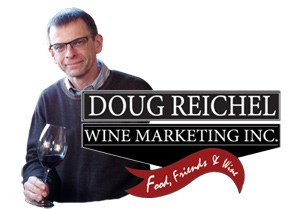A barbecue unit is about as standard in Prairie households as microwaves and lawnmowers. And what a grand summer for barbecues it's been! I learned to barbecue while living and working in South Africa for some eight years. There a barbecue was about an event, about slowing down, collecting wood or charcoal and creating this heated bed of coals for the arrival of meat or skewers of vegetables, etc. Guests and hosts lingered around the fire, wine or beer was enjoyed, we caught up on news and views, all the while having the smoke and aromas of the barbecuing enfold our visiting. You will appreciate the re-adjustment when we returned to Canada only to be kindly invited to a barbecue where the gas was turned on, the meat slapped down, the lid closed while we sat inside until the food was done.
Regardless of your barbecuing approach, most red meats and barbecued poultry call out for a nice red wine. There's a dance waiting to happen with that barbecued steak of yours and the right glass of wine.
I used to say to people, for red meat choose a big cabernet sauvignon- or shiraz- based wine that has been aged in oak, dense in flavour concentration and colour and has lots of thick body with spiciness and pepperyness to boot. i.e. all those big California, Chilean and Australian wines. The problem was that as much as those wines were great sipping before we started eating, after we brought the two together the flavour nuances in the wine were actually "trampled" or suppressed and flattened by the barbecued meat. There was no dance here, just domination in the palate, and the wine lost every time. It was Dr. Chris Holmden of the University of Saskatchewan who helped explain and guide me as to what was happening here. He noted that most New World (i.e. wines from pretty well everywhere except "Old World" Europe) big reds that were cabernet sauvignon based had a bit of fruit sweetness in the wine that actually competed with the natural sweetness in the caramelized meat in the barbecuing process. Chris noted: "Where the fruit is sweet and the palate is thick with extract, these California Cabs (and other new world reds) are also not often a good match for traditional steak and roast beef."
This is why it's the Old World / European reds that are waiting to be discovered by Saskatchewan barbecuers. French Bordeaux region wines (cabernet sauvignon and merlot based), Portuguese, Spanish and Italian (esp. Tuscan and Piedmont region) red wines have beautiful fruit but with a bit more earthy and leathery characteristics that do not compete with the sweet in the meat like New World wines do. The result: a tango in the palate! I like the idea of being invited to a barbecue tango.
Enjoy.
Doug Reichel
Visit: FineWinesSask.com
Doug's Wine Picks of the Week
Chateau Canada 2008/09 - France ($17.82 - ID# 10144); This is a real place in Bordeaux named by a Frenchman some two centuries ago after living in then Lower Canada (check out: www.finewinessask.com/video-podcasts/chateau-canada-video/). The grape varieties used: Merlot (70 per cent) and Cabernet Sauvignon (30 per cent). The vines average 25 years in age and are carefully pruned to give the best expression of the fruit. Most Bordeaux wines are "long distance runners" so the 2008 is drinking nicely now. Food Pairings: Chateau Canada begs grilled food and aged cheeses. Decant for 10-15 minutes.
Luzon Seleccion 12 2007 - Spain ($17.95 - ID# 7272); Description: Grapes (Monastrell, Cabernet Sauvignon, Tempranillo, Merlot) in this wine come from low yielding vineyards giving concentration, quality and structure. Each grape variety is aged separately in French and American oak barrels for 12 months (hence "seleccion 12") before being blended together into this amazing wine that over-delivers on quality at price. Saskatchewan is the only place in the world where you can get the 2007 vintage that drinks like silk. 2007?!..Where were you in 2007? Food Pairing: This is a stunning compliment to dense grilled red meat or just to savour. No decanting necessary.
All wines listed are available in Saskatchewan through your local government liquor store or rural liquor franchisee. If they don't have it in stock, request it by ID# - they'll bring it in.




